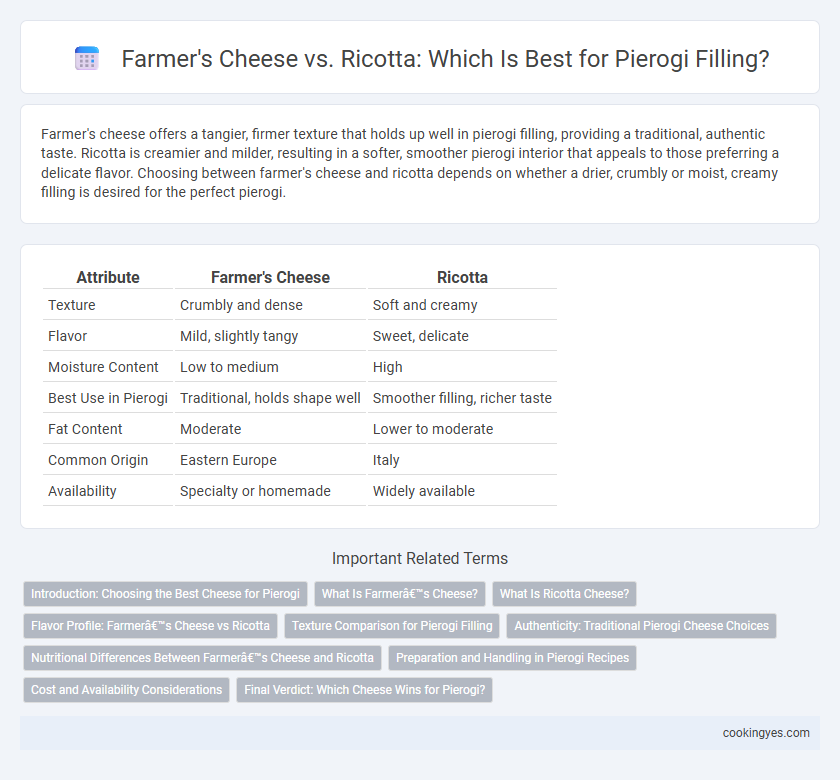Farmer's cheese offers a tangier, firmer texture that holds up well in pierogi filling, providing a traditional, authentic taste. Ricotta is creamier and milder, resulting in a softer, smoother pierogi interior that appeals to those preferring a delicate flavor. Choosing between farmer's cheese and ricotta depends on whether a drier, crumbly or moist, creamy filling is desired for the perfect pierogi.
Table of Comparison
| Attribute | Farmer's Cheese | Ricotta |
|---|---|---|
| Texture | Crumbly and dense | Soft and creamy |
| Flavor | Mild, slightly tangy | Sweet, delicate |
| Moisture Content | Low to medium | High |
| Best Use in Pierogi | Traditional, holds shape well | Smoother filling, richer taste |
| Fat Content | Moderate | Lower to moderate |
| Common Origin | Eastern Europe | Italy |
| Availability | Specialty or homemade | Widely available |
Introduction: Choosing the Best Cheese for Pierogi
Farmer's cheese offers a slightly tangy, dense texture that holds shape well, making it ideal for authentic Eastern European pierogi fillings. Ricotta provides a creamier, milder flavor but tends to be softer, which may require draining or mixing with other cheeses to prevent soggy dough. Selecting the best cheese depends on desired texture and flavor balance, with farmer's cheese favored for traditional recipes and ricotta suited for a smoother, delicate filling.
What Is Farmer’s Cheese?
Farmer's cheese is a fresh, unripened cheese made from whole or skimmed milk, characterized by its creamy texture and slightly tangy flavor, making it ideal for pierogi fillings. Unlike ricotta, farmer's cheese has a firmer consistency and lower moisture content, which helps pierogi maintain their shape during cooking. Rich in protein and calcium, this cheese enhances the traditional Eastern European pierogi experience with its authentic taste and texture.
What Is Ricotta Cheese?
Ricotta cheese is an Italian whey cheese made from the leftover whey of cow, sheep, or goat milk after the production of other cheeses. It has a light, creamy texture and a slightly sweet flavor, making it a popular filling for pierogi when a milder taste is desired. Unlike farmer's cheese, which is firmer and tangier, ricotta provides a softer and smoother consistency that enhances the delicate dough without overpowering other ingredients.
Flavor Profile: Farmer’s Cheese vs Ricotta
Farmer's cheese offers a tangy, slightly crumbly texture with a rich, creamy taste that complements savory pierogi fillings. Ricotta provides a milder, sweeter flavor with a smoother, creamier consistency, ideal for both sweet and savory variations. Choosing between the two depends on whether a more pronounced, tangy cheese or a delicate, mild cheese is desired for the pierogi.
Texture Comparison for Pierogi Filling
Farmer's cheese offers a crumbly yet creamy texture that holds its shape well inside pierogi, providing a slightly tangy and dense bite. Ricotta is much softer and moister, yielding a smoother, creamier filling that can sometimes become watery when cooked. Choosing farmer's cheese ensures a firmer, more textured filling, while ricotta creates a delicate, velvety consistency in pierogi.
Authenticity: Traditional Pierogi Cheese Choices
Farmer's cheese is the traditional and most authentic choice for pierogi fillings, prized for its slightly tangy flavor and crumbly texture that holds well during cooking. Unlike ricotta, which has a smoother and creamier consistency, farmer's cheese offers a firmer bite that complements the dough without becoming watery. Authentic Polish recipes typically emphasize the use of farmer's cheese to preserve the classic taste and texture of pierogi.
Nutritional Differences Between Farmer’s Cheese and Ricotta
Farmer's cheese contains higher protein content and lower moisture compared to ricotta, making it a denser filling for pierogi with increased satiety. Ricotta offers a creamier texture but typically has more fat and calories per serving, providing a richer taste profile. Both cheeses are good sources of calcium, though farmer's cheese generally has less sodium, benefiting those on a low-sodium diet.
Preparation and Handling in Pierogi Recipes
Farmer's cheese offers a denser texture and lower moisture content, making it ideal for pierogi fillings that require firm shapes and less sogginess during boiling. Ricotta's higher moisture and creamier consistency necessitate draining and sometimes straining to prevent runny fillings and ensure proper sealing of the dough. Proper handling of farmer's cheese involves crumbling and mixing with binding agents, while ricotta requires meticulous moisture reduction and gentle folding to maintain a smooth, cohesive pierogi stuffing.
Cost and Availability Considerations
Farmer's cheese is typically more cost-effective and widely available in Eastern European markets, making it a budget-friendly choice for authentic pierogi fillings. Ricotta, while creamier, often comes at a higher price point and is more commonly found in Western grocery stores, which may limit accessibility depending on location. Choosing between the two depends on balancing budget constraints with the desired texture and availability in local stores.
Final Verdict: Which Cheese Wins for Pierogi?
Farmer's cheese stands out for pierogi due to its firm texture and mild, tangy flavor that holds well during cooking, creating the ideal filling consistency. Ricotta, while creamy and slightly sweeter, tends to make pierogi fillings looser and less structured, often requiring additional ingredients for stability. For authentic pierogi, farmer's cheese wins as the preferred choice, delivering the perfect balance of taste and texture.
Farmer’s Cheese vs Ricotta for Pierogi Cheese Infographic

 cookingyes.com
cookingyes.com